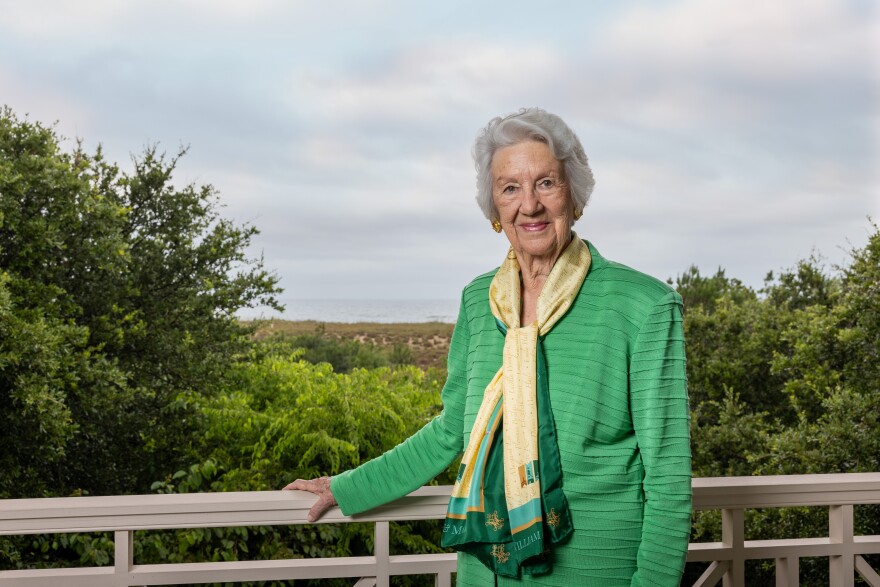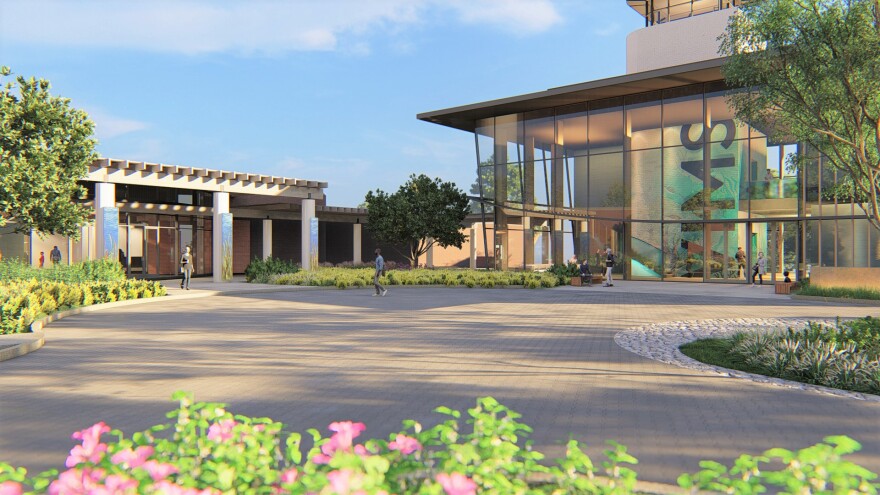William & Mary this week announced its largest gift in the university’s 331-year history: a $100-million donation to expand coastal resiliency research — with the goal of finding global solutions for climate change-related flooding, sea-level rise, water quality and more.
The donation comes from philanthropist Jane Batten, the wife of late entrepreneur Frank Batten, who founded Landmark Communications and co-founded the Weather Channel. Frank Batten grew up in Norfolk, served on William & Mary’s Board of Visitors in the 1990s and is also the namesake of the University of Virginia’s Frank Batten School of Leadership and Public Policy.
“I will not live to see the inundation of our cherished places,” Jane Batten said Wednesday during an announcement of her family’s gift. “Many of you here will. Certainly, my grandchildren will. And I will not see or experience the social injustice that results from a warming world.”

Batten pointed to reports that Sunday was Earth’s hottest day in recorded history; a day in July 2023 was the previous record holder. The record was broken again on Monday.
“That is very sobering,” Batten said. “We live in a wondrously beautiful but terrifyingly fragile environment.”
William & Mary has renamed its marine sciences program after Batten — now the Batten School of Coastal & Marine Sciences. It shares a campus in Gloucester with the Virginia Institute of Marine Sciences, a separate state agency. Earlier this year, the college’s BOV voted to add an undergraduate program alongside existing master’s and Ph.D. programming.
According to the university, it will be the commonwealth's first public undergraduate program in marine sciences. It’s tentatively planned to begin enrolling students in fall 2025. VIMS director Derek Aday, who is also the dean of the marine sciences program, said there’s already been a lot of interest among William & Mary students.
He said they want to be able to “offer it to those that are most passionate about it” through a “hands-on experience with research and internships.”

Aday also wants students to be able to pursue a minor and other training opportunities through the program. He added that students won’t live on the Gloucester campus, but will instead travel back and forth from the school’s main Williamsburg campus.
He said they’re looking into transportation options for students because “we don't want this to just be open to people that have their own transportation. We want to make sure that we're providing the opportunity to anyone that wants to engage to get back and forth.”
While the granular details of how the $100-million gift will be spent haven’t been worked out, the donation will address facilities needs, recruit and retain faculty, and provide scholarship and fellowships for students, according to university spokesperson Suzanne Clavet. The university plans to raise another $100 million for the school in the coming years.
The goal of the expanded programming and enhanced focus on shorelines and sea-level rise research is for the school to become “the premier destination” for developing solutions to threats from climate change.
Aday said when people think of marine sciences, they often think of species like sharks, oysters and blue crabs — which the school does research. But he said their focus is much broader.
“It's preparing coastal homes and business leaders and communities for the changes that will be coming ahead,” he said. “It's predicting and mitigating flooding and sea level rise, it's ensuring healthy and sustainable seafood. It's maintaining coastlines and healthy water quality.”
Aday said the initial gift from Batten will allow the program to expand on research areas it’s already invested in, but hasn’t been widely known for.
“We can really bring that to people in ways that we couldn't before; we can create a space here for them to come to campus,” Aday said. “And we can also take that message on the road to help people really understand and engage in our science in ways that we couldn't before, because we just haven't had the resources.”
About 40% of the country’s population live near coastlines — including about 5 million in Virginia. At the same time, sea levels in Norfolk are rising faster than elsewhere on the East Coast.
U.S. Sen. Tim Kaine said Wednesday that the newly-focused school will help develop solutions to preserve places like Tangier Island, which has been impacted by sea-level rise. Researchers have predicted it will be totally underwater by 2051.
“That historic community where 500 or 600 people still live and make their living the old-fashioned way is washing away into the sea,” Kaine said. “We have to decide how to save it.”



